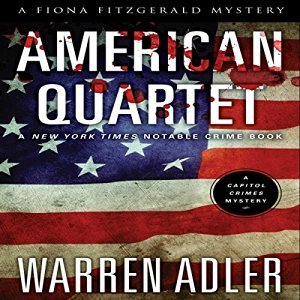
The novel’s protagonist, Fiona Fitzgerald, has abandoned the path expected of her as the daughter of a senator and serves as a sergeant in the DC Metropolitan Police Department’s homicide division – a white woman in what was then a black male bastion.
Fitzgerald and her partner face a baffling set of crimes. An art teacher is murdered at the National Gallery. An Argentinian is shot at the Pan American Union. In both cases, the department firearms examiner says old-style handguns and cartridges were used. In neither case is there any apparent motive.
By this time, you know the perpetrator is recreating, to the extent practicable, the circumstances of the assassinations of Presidents James Garfield and William McKinley. Garfield was killed at the Baltimore and Potomac Railroad Station, which stood on the current site of the National Gallery. McKinley was murdered at the Pan-American Exposition. And, you acquire a growing sense of dread recalling the perpetrator’s inevitable further recreations – the deaths of John F Kennedy and Abraham Lincoln. Garfield, McKinley, Kennedy, Lincoln: the American quartet.
Two more victims fall on the fateful anniversary of Kennedy’s death, November 22, one shot from the Library of Congress, and a police officer murdered on the street—again crimes with no apparent motive.
My credulity was strained by the police and media’s continued lack of insight into these crimes. Adler makes the point that Americans are oblivious about their history, and I’ll give him that. But the shots fired by Lee Harvey Oswald from the Texas School Book Depository that (supposedly) killed JFK are seared into the national memory, especially in Washington. They are rehashed every November (lots of TV coverage to pull out of the vault), and in 1980, these events were only 17 years in the past. About how long ago Y2K is now. Fitzgerald has forgotten about the death of Officer JD Tippit, killed by Oswald shortly after murdering JFK, thus doesn’t tumble to that link either. Police don’t forget police killings.
Fitzgerald (sharing a name with the martyred president) may be distracted by her love life. When the first two crimes are committed, her boyfriend, Bruce Rosen, is facing a tough re-election battle. He dismisses the importance of her career and wants her with him in his home constituency in Queens, New York. The district’s demographics have moved away from him, and his campaign needs a large infusion of cash and some new ideas to wrest it away from an up-and-coming Latina politician. What can save him is the financial support of failed senatorial candidate Thaddeus Remington, a wealthy player in the Washington party circuit. There’s a downside to being in Remington’s pocket, which the desperate Rosen is slow to acknowledge.
Though some aspects of the story seemed far-fetched, the politics of the day are interesting particularly as we are in an election year.
Listening to a book is a different experience than reading it. Most of the principal characters in American Quartet are men, and narrator Julie Griffin does a good job with them. Yet, I kept checking my iPod to make sure I hadn’t inadvertently clicked a 1.5 reading speed. Also, there seem to be some mis-readings – colonel pronounced more like it’s written than the accepted ‘kernel’. There are other words too. The point isn’t to ding her on the kind of mistake any of us might make from time to time, but to emphasise that such errors – like typos – take you out of the moment and shatter the fictional dream.
This is the first in Warren Adler’s nine-book Fiona Fitzgerald series, which have all been made into audiobooks. You can read our interview with the author here.
Stonehouse Productions
Audiobook
£14.69
CFL Rating: 3 Stars